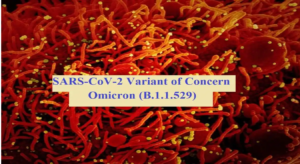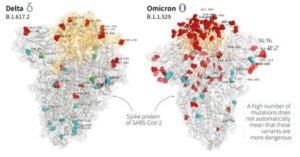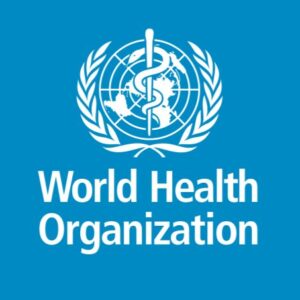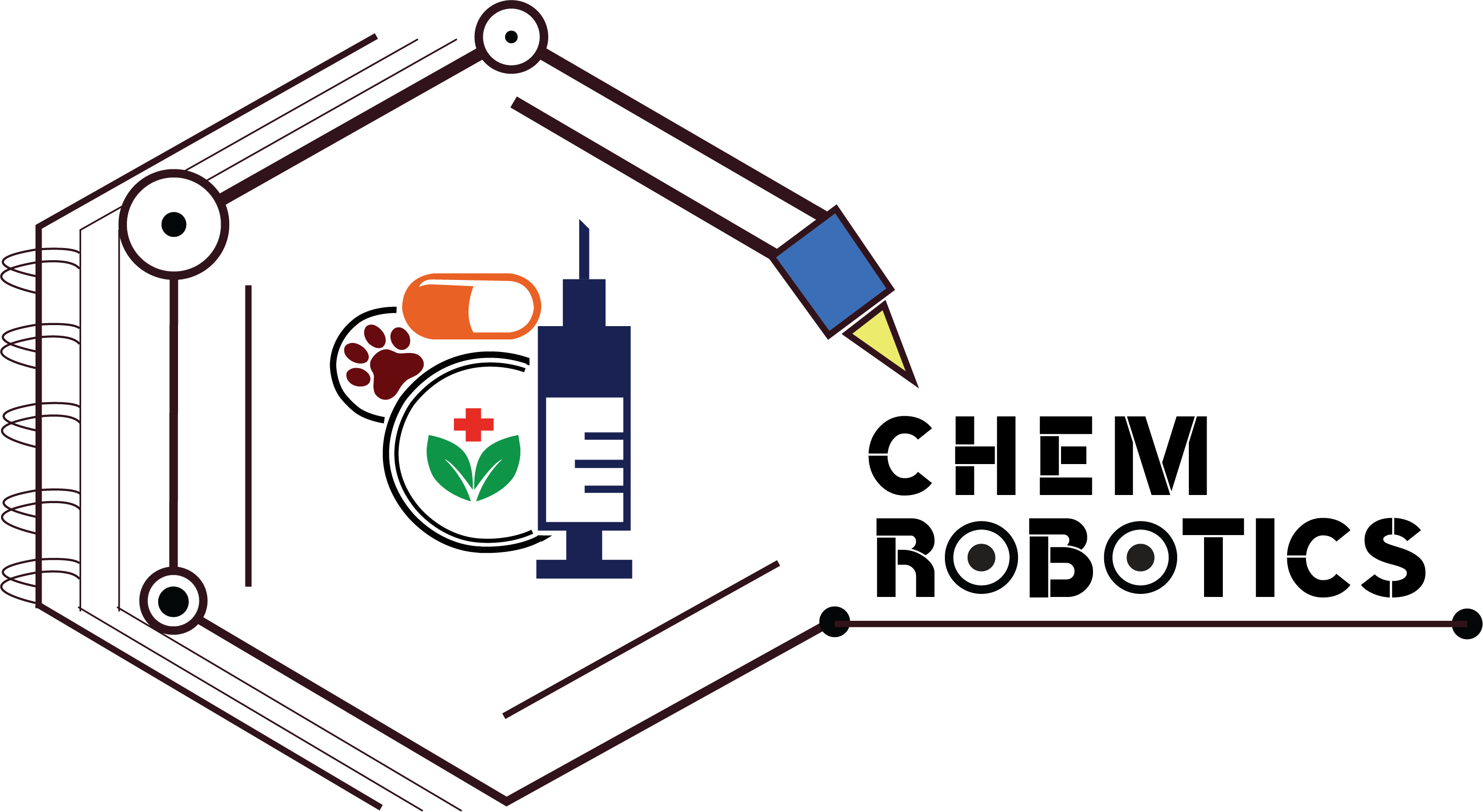SYNOPSIS:
- The UN health agency said the Covid strain first discovered in southern Africa was a “highly divergent variant with a high number of mutations, some of which are concerning and may be associated with immune escape potential and higher transmissibility.”
- On the three-dimensional “image”, which looks like a map, “we can clearly see that the Omicron variant presents many more mutations than the Delta variant, concentrated above all in one area of the protein that interacts with human cells”, the team of researchers said.
- The new variant has over 50 mutations, with over 30 mutations detected in the spike protein which can be a cause of concern as it is the region through which the virus enters the body and has been used as the target region for multiple vaccines against Covid.
- The next two four weeks will be crucial in terms of how the new variant impacts health, said Naresh Trehan, chairman of industry body CII’s Healthcare Council. India will also need to ensure medical preparedness to deal with any emergencies, corporates have said.
- The WHO is opening a long-planned special session of member states to discuss ways to strengthen the global fight against pandemics like the coronavirus.

WHO warns Covid-19 variant Omicron Poses Global risk ‘Very High’.
The heavily mutated Omicron coronavirus variant is likely to spread internationally and poses a very high risk of infection surges that could have “severe consequences” in some places, the World Health Organization (WHO) said on Monday.
No Omicron-linked deaths had yet been reported, though further research was needed to assess its potential to escape protection against immunity induced by vaccines and previous infections, it added.
In anticipation of increased case numbers as the variant, first reported last week, spreads, the U.N. agency urged its 194 member states to accelerate vaccination of high-priority groups and ensure plans were in place to maintain health services.
“Omicron has an unprecedented number of spike mutations, some of which are concerned for their potential impact on the trajectory of the pandemic,” the WHO said.
“The overall global risk related to the new variant is assessed as very high.”
Tedros Adhanom Ghebreyesus, WHO director-general, sounded the alarm at the start of an assembly of health ministers that is expected to launch negotiations on an international agreement on preventing future pandemics.
“The emergence of the highly mutated Omicron variant underlines just how perilous and precarious our situation is,” Tedros said. “Omicron demonstrates just why the world needs a new accord on pandemics: our current system disincentivizes countries from alerting others to threats that will inevitably land on their shores.”
The new global deal, expected by May 2024, would cover issues such as sharing of data and genome sequences of emerging viruses, and of any potential vaccines derived from research.
First image of the new Covid variant Omicron shows many more mutations than Delta:

First image of new Covid variant Omicron shows many more mutations than Delta:
The new Covid variant Omicron has many more mutations than the Delta variant, according to a first “image” of this new variant initially detected in South Africa, produced and published by the prestigious Bambino Gesu hospital in Rome.
According to Claudia Alteri, professor of clinical microbiology at Milan State University and a researcher at Bambino Gesu, the study team concentrated on looking for changes in “the three-dimensional structure of the spike protein.”
In the three-dimensional “image”, which looks like a map, “we can clearly see that the Omicron variant presents many more mutations than the Delta variant, concentrated above all in one area of the protein that interacts with human cells,”, the team of researchers said in a statement Sunday.
“This does not automatically mean that these variations are more dangerous, just that the virus has further adapted to the human species by generating another variant,” the researchers said.
“Other studies will tell us if this adaptation is neutral, less dangerous, or more dangerous,” they added. While there may be additional subtle alterations, the larger ones tend to affect factors like the virus’s transmissibility.
The newest form included more than 50 mutations, which Prof Bennett described as “strange” when compared to the handful of large changes seen in prior variations.
Because the spike area is where the virus binds to human cells and where vaccinations are focused, mutations in this region are particularly important. Even if a person has been vaccinated or has had Covid previously, if the variety is sufficiently different from past forms of the virus, our immune system may fail to recognise it or remember how to fight it.
According to the World Health Organization, there were at least 10 mutations in this variation associated to the receptor-binding domain on the protein spike.
WHO members eye pandemic preparation, as new variant emerges:

WHO members eye pandemic preparation, as new variant emerges:
A treaty would suggest a legally binding agreement that would require ratification and would likely incur domestic political haggling in some countries.
Britain’s ambassador in Geneva, Simon Manley, tweeted a copy of the draft text that was agreed by consensus as required under WHO rules on such issues and praised Chile and Australia for their work as co-chairs.
The Omicron variant shows yet again why we need a common understanding of how we prepare for and respond to pandemics, so we’re all playing by the same rules,” he wrote.
The draft makes no reference to the word treaty but, among other things, calls for the creation of an intergovernmental negotiating body among WHO member states to work out a possible deal to improve pandemic prevention, preparedness and response.
The three-day, largely virtual meeting that opens Monday amounts to a long-term approach: Any U.N.-backed agreement is likely to take many months, if not years, to be concluded and come into effect.
But it comes as many countries have been scrambling to address the emergence of the new omicron variant that has led to travel bans across the world and sent tremors through stock markets on Friday.
Covishield, Covaxin can protect against Omicron, claim experts:
Covishield and Covaxin jabs can prevent hospitalisation or death that may result from the new Botswana variant Omicron (B.1.1.529), the Covid-19 virus’s most mutated version as yet, virologists and infectious diseases experts have said.
Senior scientist Raman Gangakhedkar, former head of the epidemiology and communicable diseases division of the Indian Council of Medical Research (ICMR), said “Theoretically, it is possible that the new variant of concern (Omicron) may challenge vaccines’ efficacy. But, we know that our vaccine prevents hospitalization and death. People must take two doses of the vaccine and adhere to Covid-19 appropriate behaviour, especially that of wearing a mask, to ward off infection from such variants”
Gangakhedkar is one of the 26 members of the WHO team appointed to examine the origins of pathogens such as SARS-CoV-2 that cause pandemics.
“There is not enough data yet to understand Omicron’s ability to evade vaccine or a natural infection-induced immune response. Hence, we should continue to enhance coverage in vaccine roll-out so that hospitalisation does not increase.
Unvaccinated people must take two doses of the vaccine and those who have taken one dose must take the second dose at the earliest, earliest,” Gangakhedkar said. “More studies are needed to whether previous exposure to the Delta strain or currently available vaccines will shield us against severe illness due to omicron ,” infectious diseases expert Sanjay Pujari, a member of the National Covid Task Force, told TOI.
Prasad Kulkarni, Serum Institute of India’s vaccine expert said that given the experience of other variants, including the highly contagious Delta, it is most likely that the vaccines, as well as the past infections, will give protection from Omicron.“So, we may not have to worry too much,” he said.
“I don’t see any need for concern over Omicron. Prior infection and vaccination would definitely help against this variant in causing severe cases,” said Arvind Kushwaha I Community and preventive medicine expert AIIMS, Nagpur
India Inc is on high alert, to keep a close watch on the new strain.
As the new COVID-19 variant Omicron is spreading to more countries after being first detected in Botswana, authorities are gearing up to tackle any impending crisis. In India, several states are on high alert and reviewing guidelines to deal with any emergency in the wake of the new variant. India Inc is keeping a close watch on the worries caused by the Omicron variant while many corporate houses have asked their employees to strictly adhere to rules while travelling abroad “We all are following COVID-appropriate behaviour and advised employees to travel abroad only if necessary and follow respective country’s travel advisories,” Sunil Kataria, CEO of Godrej Consumer, told The Economic Times.
Even as the world evaluates the impact of the new COVID-19 variant, India Inc believes the next two-four weeks will be crucial.
“It’s clearly a wait-and-watch and we have to be extremely cautious to travel to/from the restricted countries,” Naresh Trehan, Chairman of industry body CII’s Healthcare Council was quoted as saying by ET.
Despite healthy growth signs in the Indian economy after the disruptions induced by the COVID-19 pandemic, there are concerns around what is happening in Europe and South Africa and the fresh lockdowns in part of Europe, according to Commerce and Industry Minister Piyush Goyal.
The discovery of Omicron is “very concerning” as the global economy was getting back on track to some degree of normalcy, according to RPG Enterprises Chairman Harsh Goenka, the report added.
Industrialists felt that the government should increase the pace of vaccination across states to ensure economic growth remains on track. Corporate leaders apprehend any complacency over vaccination could prove costly for the country and urge the government to ramp up the vaccination coverage to 100 percent.
Meanwhile, experts have said the new COVID-19 strain will not impact the mobile manufacturing industry and its sales even though exports to African countries may get hampered.
“From now till January-end, the market is anyways on the lower side and only gains momentum after Chinese New Year in mid-February,” Faisal Kawoosa, Founder of Techarc, was quoted as saying by Mint. He said the supply chain for the smartphone industry is unlikely to get affected by the new strain though it was too early to comment.
Analysts believe the global equity markets, including India, have reacted too soon, registering sharp sell-offs in the past few sessions over concerns of the Omicron variant.
“The global markets have overreacted without waiting for the scientific assessment of Omicron on rate of hospitalisation, death rates and efficacy of existing vaccines. There is a possibility of global equity markets stabilising in this week itself. Thanks to recent corrections, valuation of the domestic equity market has moderated,” said G. Chokkalingam, Founder of Equinomics Research, reported Business Standard.
All we know about infectious Omicron variant so far:
The recently discovered variant of coronavirus, Omicron has sparked fear across the globe world because of its rapid transmissibility. The scientists in South African where it was detected informed that this new it was detected informed that this new variant of the SARS-CoV-2 with numerous mutations, possibly highly infectious than the variants detected earlier. The World Health Organisation (WHO) classifying the newly detected mutated virus as the ‘Variant of Concern’.
What are mutations noticed in the Omicron variant?
Experts from Centre for Epidemic Response and Innovation in South Africa have noted that the new variant has over 50 mutations, with over 30 mutations detected in the spike protein which can particularly be a cause of concern as it is the region through which virus enters the body and has been used as the target region for multiple vaccines against Covid. Some of the mutations witnessed in the Omicron variant as of yet are H655Y + N679K + P681H, Deletion of nsp6, deletions at positions 69 & 70 and R203K+G204R which in preliminary analysis suggests has increased transmissibility and can possibly evade the immunity against virus.
Is the variant more transmissible than the earlier variants?
The variant has spread rapidly in South Africa with the country reporting triple the number of cases reported earlier, 90 percent of which can be attributed to the new variant. The preliminary analysis suggests that the mutation might have led to higher transmissibility of the virus, an analysis yet to be confirmed. The deletion within the S gene however, helps in identifying the presence of the new mutation within the test without the need for further genomic sequencing.
Where has it spread so far?
After its detection in numerous Covid patients in South Africa, a number which can potentially be more than that reported, many countries from around the world placed travel restrictions on travellers coming in from Africa and surrounding regions. Many countries like the Netherlands, Australia, UK, Italy, Germany, Belgium, Hong Kong amongst others have already detected cases of the Omicron Covid variant.
What steps are being taken to stop it from spreading?
Several countries including US, Israel, European nations amongst many more have imposed restrictions on people travelling from the ‘at-risk’ countries including countries in the African region. Cases have been identified in many nations across the globe, mandating on-arrival testing in most countries still allowing international passengers. While South African experts have called the restrictions ‘draconian’, most health experts believe it is the right measure to delay the spread of virus until enough information, medicines and vaccines are available to provide protection.
For more Information: Sign-in Websites for Agrochemical & Pharmaceutical Databases:
Website: https://www.chemrobotics.com/ (Agrochemical Databases)
Website: https://chemroboticspharma.com/ (Pharmaceutical Databases)


